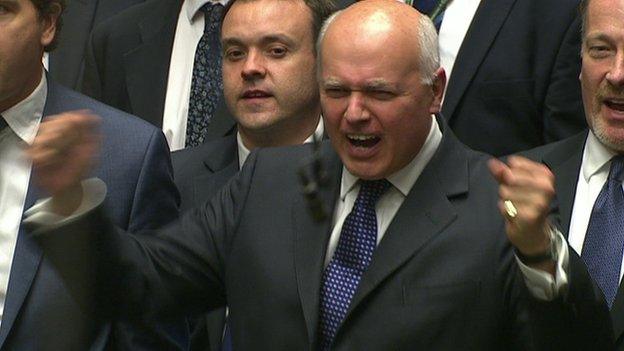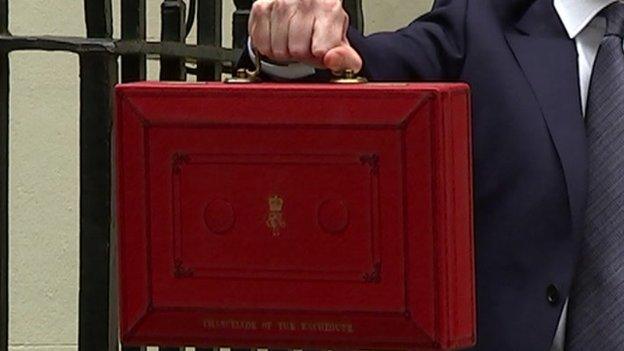Budget 2015: Osborne offers country 'new contract'
- Published
- comments
George Osborne: "The country can afford [higher wages], British business can afford that"
Chancellor George Osborne has rejected criticism of his Budget insisting it offers the country a "new contract".
He said businesses will have to pay higher wages but will pay lower taxes in return - while workers will get higher pay but fewer benefits.
This created a "new centre" in British politics and was a "fair deal" for all, he told BBC Radio 4's Today programme.
Labour has attacked the Budget for being too hard on the poor and called the National Living Wage a "con".
Budget Calculator: How will the Budget affect you?
The Institute for Fiscal Studies, in its Budget analysis, said Mr Osborne was "plain wrong" to argue that the National Living Wage he announced on Wednesday would compensate for benefit cuts and said it will cost three million families an average of £1,000 a year.
'Free ride'
IFS director Paul Johnson told BBC News: "The cuts will be bigger for people in work than they will be for people out of work and in the new universal credit system it will reduce the incentive for people to move in to work."
He also questioned whether another of Mr Osborne's announcements, a four year freeze on public sector pay, was sustainable as it will leave public sector pay at its lowest level compared to private sector pay since records began.
"The tax and welfare changes between them mean that poorer households have lost quite significantly and as a result of yesterday's Budget, much more significantly than anything that has happened to richer households," added Mr Johnson.
Downing Street said the combination of the living wage, higher personal tax allowance and welfare changes meant the typical family with a full time worker on the minimum wage would be better off in 2020.
Harriet Harman said the Budget "will make working people worse off"
Mr Osborne unveiled the National Living Wage in a surprise announcement at the end of his Budget speech on Wednesday. Paid to over-25s, it will start at £7.20 and rise to £9 an hour by 2020.
But a £4.5bn cut to tax credits, part of a £12bn package of welfare cuts announced on Wednesday, will kick in next April, leading Labour to accuse Mr Osborne of "pulling the rug from under" many poor families.
Shadow Chancellor Chris Leslie said: "Don't underestimate how important those tax credits have been for many, many people who will be waking up this morning and, I think, left reeling by the massive reduction to their quality of life that will come because of the nature of this set of decisions."
Tax credits were introduced in 2003 by Gordon Brown to top-up the wages of low paid workers but Mr Osborne said their cost had ballooned to an unsustainable £30bn a year and he wanted to make businesses give their workers a pay rise instead. He will also make firms fund more apprenticeships through a new levy.
The chancellor said there were some "really great British companies" but others that "frankly have taken a free ride" by not training their own workforce and using the training that others have provided.
'Fair system'
He said Britain has a "welfare system that is unsustainable" and that we "can't have a welfare system that just grows and grows and grows".
He said his aim was to create a welfare system that was "fair to those who need it and fair to those who pay for it".

Analysis by Political Editor Nick Robinson
George Osborne's stated aim was to create what he called a "new settlement". That's politician's code for re-writing the rules of politics to suit your side.
So it is that he did something rather surprising - slowing and softening spending and welfare cuts now having promised faster and deeper cuts in the run up to the election.

The living wage will give a pay rise to six million workers but is expected to cost 60,000 jobs, according to the Office for Budget Responsibility.
But Mr Osborne said other measures in his Budget would help create a million more jobs.
London Mayor and Conservative MP Boris Johnson - seen as a potential rival to George Osborne to be the next Tory leader - said the National Living Wage was a "huge step in the right direction" but added that firms needed to pay the higher existing London Living Wage of £9.15 an hour to properly offset benefit cuts.
He told BBC News: "The problem with the tax credits is that they have all these cliffs and poverty traps that discourage people from earning more.
"The answer is to get more money into their pockets through the London Living Wage."
Budget 2015
Key points
£47.2bn
raised through tax increases
£34.9bn
raised from cuts to welfare
-
Inheritance tax threshold rises to £1m
-
Corporation tax cut to 18%
-
Personal allowance rises to £11,000
-
National hourly "living wage" by 2020 of £9
The chancellor has also been criticised by a Conservative MP for protecting pensioners at the expense of young people.
Dr Phillip Lee questioned what he described as "this apparent desire to ring-fence pensioners from the realities of the financial position that this country finds itself in".
He said the government needed to reduce the amount it spends on "our pensioners and on the post-work period of our lives".
The Treasury confirmed the living wage would apply to both the public and private sectors.

Work and Pensions Secretary cheers the national living wage announcement
Work and Pensions Secretary Iain Duncan Smith jokes that he must be more statesmanlike as he he is greeted in the Commons by Tory MPs mimicking his Budget fist-pumping celebration.
The Local Government Association said it welcomed the move, but warned it would add a "potential upward pressure" to council budgets and said it expected local authorities to be compensated.
Business groups gave a mixed reaction to the National Living Wage pledge, with the Institute of Directors saying it was "time for companies to increase pay" but the CBI said the government was taking "a big gamble" on wage increases that industry might not be able to deliver.
The Living Wage Foundation director Rhys Moore said the proposed £9 rate was a "massive victory" for campaigners, but that it was "effectively a higher national minimum wage and not a living wage", due to the different ways the two rates are calculated.
The TUC welcomed the announcement but said Mr Osborne was "giving with one hand taking with the other" and "massive cuts in support for working people will hit families with children hardest".

- Published8 July 2015
